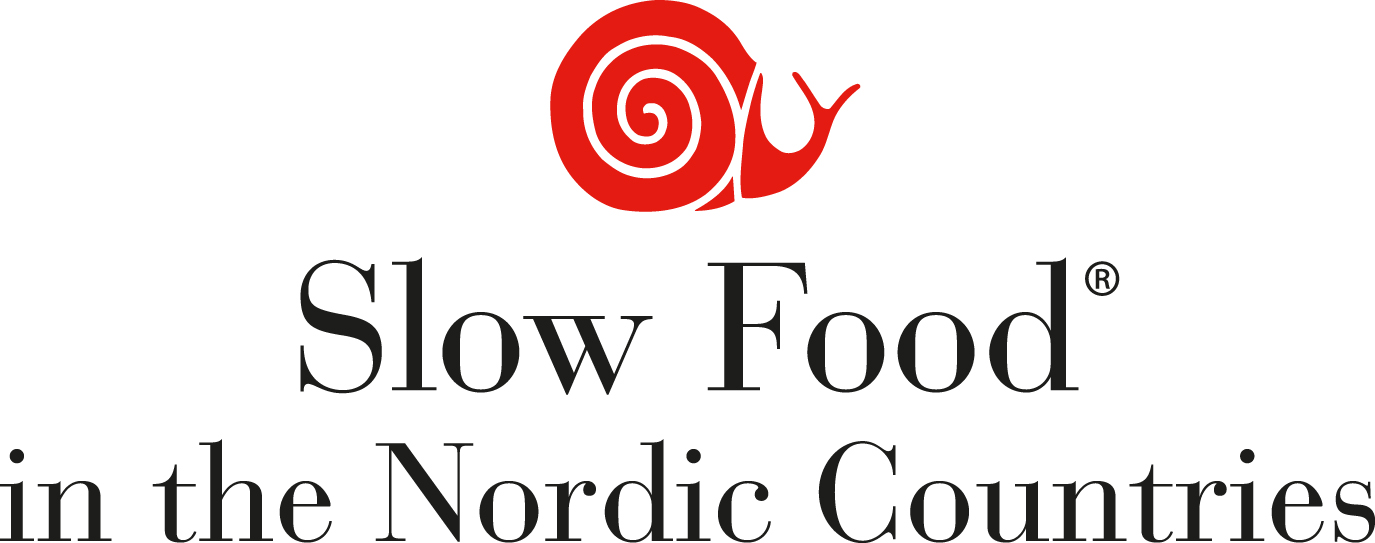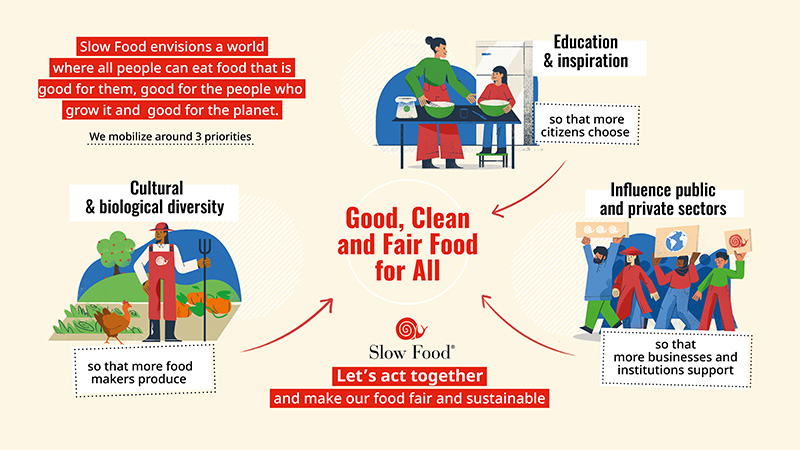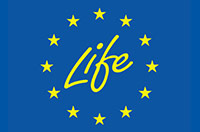AN URGENT CALL TO SLOW DOWN
The Purpose of this Document
A Call to Action
This is a letter intended to engage every level of the Slow Food network in an effort to systematize our work and to measure and leverage our impact in order to create a better world.
Timeline
This is a document. The ideas it contains should be read and discussed in advance of the Slow Food Congress, where it will become the formal collective commitment that we make for the critical decade of action ahead.
An Instrument
This is a working tool for every level of the Slow Food network, from individual members to convivia, and from national organizations to local and thematic communities. It is a common guide for identifying and setting targets that hold us accountable to each other.
Introduction and context
The world is in crisis. This was clear before the pandemic. Since the dawn of the 21st Century, we have been buckling beneath 20th Century stresses of speed, efficiency, and scale. However, these have come at such an alarming pace that our unquenching thirst for more and more blinds us from recognizing physical limits even as ecosystems push back, unable to keep pace. The interesting thing is that the COVID-19 virus creates the circumstances that are new. They are tragic and unexpected (even if the events are, oddly and sadly, predictable).
Undoubtedly, we miss contact with people and our social lives of effortlessly eating and drinking with friends and hugging our beloved. However, also held in suspended animation were the systems that define the rhythm of global consumption. The year 2020 represented a critical moment to ask big questions (even as, and especially because, it reveals dangerous fissures in our societies). For those who had little, now they have even less. While we must not adjust our gaze away from these major structural deficits, we must also not lose this opportunity to pose these and other existential questions: Has our insatiable appetite to consume more played a contributing role to triggering this and others crises? Why are large systems cracking when small communities appear resilient? Throughout our network, we have witnessed so many examples of this resilience. If the causes of the current crisis are deeply rooted in global food production, then might also the seeds for a hopeful future to flourish revolve around our relationship to food?
With frightening regularity, United Nations reports state that if we do not reduce carbon by 45% by 2030, human civilization is at risk of collapse. The crises of ecosystem destruction and degradation, biodiversity loss, the endless flow of refugees, increasingly weak democratic institutions (in all aspects of our lives), the concentration of greater power in fewer hands, growing unemployment/underemployment and the paradoxical coincidence of hunger and obesity are becoming alarmingly apparent. This dramatic situation is symptomatic of a structure that is both physically unsustainable and ethically wrong, based on the illusion of infinite, unlimited growth. This system dominates our lives and reduces us to a species in danger of extinction, as the Slow Food Manifesto warned us 30 years ago.
Without growth, systems break With it, we devour all that is left on planet Earth. This is the challenge that defines our age.
And yet, WE are ready to confront this historic moment and to allow our alternative model to flourish.
Slow Food has been preparing for a long time. We have planted seeds all over the world with projects, communities and leaders who inspire others. We have created social spaces in which we learn together how to build a better world through experience, diverse approaches and reciprocal exchange.
Each of us has the power to create change, develop new models for the future. We can help others change from being passive consumers into the protagonists revitalizing their communities. Each of these things is a step toward the future that we want to live.
While the challenges that we face are daunting, do not despair. Fortunately, others in civil society are joining us to map the future we want. They are giants, but we are the multitudes. With increased urgency, we continue to provide that social space in which everyone has the opportunity to understand the past and shape the future .
What has become of those seeds that our network has scattered all over the world? Look around: They have germinated and flourished. Wherever you are, you are not alone. We are all part of a global network. And, while nourishing biodiversity, educating and advocating for good, clean and fair food for all in your corner of the planet is also paramount. Progress begins with the exchange of stories, knowledge, global projects and the relationship we have with one another. The Manifesto reminds us that it is not enough to just do your own thing; the crucial nature of the next decade demands that we work together harmoniously, peacefully and strategically.
Why is food strategic? It is the ultimate cross-cutting issue of our age. Look at the 17 UN Sustainable Development Goals (SDG): Food plays a strategic role in each of them. When we bring our accrued knowledge to these important international conversations about the future of our planet, we also bring with us the Slow Food spirit. We must acknowledge that food is both a victim and a cause of the climate crisis, ecological collapse and other global crises. The fact that our positive impacts are aligned with the UN Sustainable Development Goals (SDG) helps us to communicate our most important, if complex, message: In the context of the crises we face, food is more than a victim and a cause; it is a comprehensive solution.
The world we want
Together, our contributions make it possible to have the incredible opportunity to imagine a different world here and now. We are committed to transforming the food system to guarantee GOOD, CLEAN and FAIR FOOD FOR ALL.
In the future that we envision, we are closely linked with the resilient ecosystems around us; everyone respects and promotes diversity of people, cultures, places, foods, and tastes. The food system changes because we change.
Each of us, in our daily activities, already experiences fragments of the world we want: Gardens are platforms for multigenerational learning; communities of producers transform endangered products into economic assets; farmers markets bring the urban and rural into contact; awareness campaigns use food to promote important social and environmental issues; gatherings and events bring people of all ages and backgrounds together; and kitchens become social spaces of education, reflection and action to redesign our relationship with food. What we need to work for is for all of these actions to come together for each of us every single day. Across the world incredible models have already been implemented, tested and proven to be extraordinary impactful. We believe in uniting the joy of food with the pursuit of justice, for the right to pleasure and policies that defend the multitudes from that minority of people who want to turn happiness and life itself into commodities.
We need to build food systems that are resilient in the face of the growing environmental and social adversities, starting from the most vulnerable contexts. Given the enormous complexity of global food systems, there is, of course, no single strategy, so we celebrate the great many passions and ideas which individuals and communities enact to make our economies more circular and our world more balanced:
- Biodiversity
- Diversity of food cultures
- Food sovereignty
- Food security
- Defense of the commons
- Agroecology, sustainability and soil regeneration and maintenance
- Renewable energy in food production
- Family farming
- Community fisheries
- Animal welfare and well-treatment and ethical relationships with animals
- Local food
- Fair, short and transparent production and distribution chains
- Exchange of intercultural, intergenerational, community and scientific knowledge
- Rural livelihoods
- Urban agriculture
- Social farming
- Health and welfare
- Equality and environmental and social justice
- If your passion is not already on this list, add it here: …
In order to increase our impact and effectiveness, we don’t need to limit the scope of our efforts; we just need to act more strategically. Our network’s guiding approach must be to act locally and think globally.
We’re more than just a network: we learn day by day to better organize ourselves, creating tangible, reciprocal relationships of trust and respect, both among ourselves and in the exchanges with the world around us.
We are a global network of local communities
In this critical regard, we differ from other organizations. Consider, for example, our approach to food biodiversity. It is not enough to simply catalogue endangered foods. We spread biodiversity and entrust it to those who protect it as part of their everyday lives. We grow, market, and eat it. This is why we proclaim: “eat it to save it!” Other organizations turn to communities primarily for support or validation. We ARE a community. Our diverse human relationships describe not only how we work, but also who we are. Look around: Who is with us? Who is leading the charge? Let’s continue to work side by side with them. But also, we must ask, who is missing and how can we enrich our diversity in order to enhance our synergies? When we address these questions, we work more intelligently.
We are an organization that joyfully manifests its respect and affection for life, self-determination, human rights and individual freedoms. Our fundamental principles are empathy for all living beings and solidarity with all the peoples of the planet, especially the most vulnerable and those who are most affected by these global crises. We emphasize the role of Indigenous communities—especially women and youth, who are too often victims of transgressions and struggle to be heard despite their vital and crucial role for our future.
We believe in the fundamental importance of assembling the diverse voices that call for and manifest changes in the food system via their words and actions around the world. We have all developed skills through the things that we do on a daily basis. We are a multitude of farmers, fishers, cooks, educators, technicians, teachers, journalists, writers, advocates and consumers, all involved in daily decisions that can forge a better food system. We defend the diversity of the natural world that surrounds us and we find strength in the diversity of the participatory network that is Slow Food.
Strategic priorities and goals
In 30 years, our network has spread to 160 countries. Slow Food is present almost everywhere on the planet. Together, we learn how to navigate between the tyranny of the big and the beauty of the small, two realities that exist side by side. While our systems may appear weak compared to the massive agroindustrial system, we are in fact strong: As crises multiply and intensify, our system survives because it is more nimble and resilient. Just ask those who farm, work, educate, cook and live slowly, with care for the things around them: They have a better quality of life. Nevertheless, the urgency of our times requires greater trust, concentration and determination, and obliges us to connect to the wider world via commitments, actions and projects focused on three important priorities:
- Defend biological and cultural diversity
When we defend biodiversity, we go beyond the biological diversity of plants and animals and think about the relationship between people and nature, as well as the traditional knowledge that has given rise to thousands of techniques for transforming raw materials into breads, cheeses, cured meats, sweets and more. For us, biodiversity begins with the invisible and includes the microscopic organisms that give life to soil and food. Biodiversity is preserved and enhanced within human societies, and for this reason it is also crucial for promoting and protecting cultural diversity.
Our goals:
a) Research and catalogue the heritage of biological and cultural diversity linked to food (as an expression of territory) and identify the people who protect this heritage.
b) Support and promote those who preserve biodiversity and act as caretakers of local territories; those who use agroecological techniques and sustainable animal farming practices that respect animal welfare; those who manage the resources of the oceans, rivers and lakes without overexploiting them; those who promote an agricultural model that can stop the spread of monocultures and intensive farming and the concentration of power in just a few hands.
c) Create opportunities for dialog and exchange (commercial and otherwise) between those who work to bring food from “farm to table” and consumers.
2. Educate, inspire and mobilize people
When you learn through the senses, by doing and playing, you understand the world. These emotional sensations represent driving forces to change individuals and forge community. And, this approach is not just an effective technique for conveying knowledge; it is an approach which makes learning relational, in which each of us is simultaneously student and teacher. Through this approach we urge the promotion of best practices around the world and point out the bond between the health of the planet and our own.
Our goals:
a) Develop communications materials and launch campaigns to increase awareness about the food system and to change behavior.
b) Design and deliver educational and training activities and experiences to improve knowledge about food— from production to consumption to food loss—and to impact people’s practices and choices.
c) Design and deliver educational and training activities for professionals in the food sector in order to reward those who make positive changes in food production, distribution, marketing, consumption and waste management.
3. Influence policies in the public and private sector
We advocate for the world in which we want to live. We engage both the public and private sectors and always look for the signs that show us how, and with whom, we can achieve a better future. It is important to understand that we cannot do it alone. We forge ties with others in order to defend those who are negatively impacted by the industrial food system. We must do this work both for others and with others. We are the multitudes.
Our goals:
a) Influence public institutions and the private business sector at every level in order to create policies and models that support fair and regenerative systems of production, distribution, marketing, consumption and management of food loss.
b) Inform, involve and mobilize individuals and communities to become advocates for the necessary transition to fair and sustainable policies.
c) Create alliances with others who are fighting for similar goals.
Together we must identify targets and hold ourselves accountable (within the context of where we live and work) in order to ensure our sustained commitment to these three goals. We must be attentive and flexible, as important cross-cutting objectives may emerge. Some are already clear. For example, in terms of communication we must convey our mission with greater clarity and be more open to diversity. After all, we are a movement! While in the past we may have thought we were only speaking to our members, today we must remember the wider world of supporters and followers who are also seek a different world. As such, we must increase the diversity of languages we communicate in, including local ones. The other cross-cutting issue is fundraising: We must improve our development strategies and diversify income streams. These are also tools for achieving the reality we want to live in.
Together, let’s make good, clean and fair food for all a reality
In the 30 years since the signing of the Slow Food Manifesto, much has changed in the world. Our movement and message have migrated from the margins to the center of communities, as any farmer, winemaker, cheesemaker or fisher who has navigated the turbulent changes in our world since 1989 would attest. Public imagination about traditional foods, respect for those who work in the fields or sell food on the market and in small shops, and opportunities for people who want to become farmers or food artisans are all growing and becoming more prevalent. All together, we truly are changing the food system! In each of the three key areas where we find ourselves engaged, we can strengthen the strategic nature of our work and develop actions and alliances, keeping in mind a clear vision of what we hope to achieve.
We are vast and diverse networks of individuals and communities who nourish heritage and local diversity to support emerging leaders and solutions for the future. We do not simply represent the many left behind by the forces of speed and scale. Rather, we are with the many. In fact, we ARE the multitudes, and together, we are growing the food movement.
This document is an urgent call to collective action. But first and foremost, it is a tool to help us recalibrate and focus our commitments to each other so that we can be more effective. Between now and the International Congress, we will meet to discuss and identify measurable results.
Together we can defend our food, our planet, and our future!



